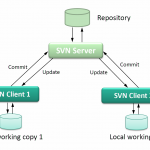git基本命令
这里列出了平时使用最多的git的命令,
| 命令作用 | 详解 | Git 命令 |
|---|---|---|
| 创建新的本地仓库 |
git init
|
|
| 克隆一个远程仓库到本地仓库 |
git clone /path/to/repository
|
|
| 克隆一个远程仓库到本地仓库并且使用某个用户,这里是username这个用户 |
git clone username@host:/path/to/repository
|
|
| 添加一个或者多个文件到staging状态 |
git add <filename>
git add *
|
|
| Commit changes to head (but not yet to the remote repository): |
git commit -m "Commit message"
|
|
Commit any files you've added with git add, and also commit any files you've changed since then:
|
git commit -a
|
|
| Send changes to the master branch of your remote repository: |
git push origin master
|
|
| Status | List the files you've changed and those you still need to add or commit: |
git status
|
|
If you haven't connected your local repository to a remote server, add the server to be able to push to it: |
git remote add origin <server>
|
|
| List all currently configured remote repositories: |
git remote -v
|
|
| Create a new branch and switch to it: |
git checkout -b <branchname>
|
|
| Switch from one branch to another: |
git checkout <branchname>
|
|
| List all the branches in your repo, and also tell you what branch you're currently in: |
git branch
|
|
| Delete the feature branch: |
git branch -d <branchname>
|
|
| Push the branch to your remote repository, so others can use it: |
git push origin <branchname>
|
|
| Push all branches to your remote repository: |
git push --all origin
|
|
| Delete a branch on your remote repository: |
git push origin :<branchname>
|
|
|
Update from the remote repository
|
Fetch and merge changes on the remote server to your working directory: |
git pull
|
| To merge a different branch into your active branch: |
git merge <branchname>
|
|
|
View all the merge conflicts: View the conflicts against the base file: Preview changes, before merging: |
git diff <sourcebranch> <targetbranch>
|
|
| After you have manually resolved any conflicts, you mark the changed file: |
git add <filename>
|
|
|
Tags |
You can use tagging to mark a significant changeset, such as a release: |
git tag 1.0.0 <commitID>
|
| CommitId is the leading characters of the changeset ID, up to 10, but must be unique. Get the ID using: |
git log
|
|
| Push all tags to remote repository: |
git push --tags origin
|
|
|
If you mess up, you can replace the changes in your working tree with the last content in head: Changes already added to the index, as well as new files, will be kept. |
git checkout -- <filename>
|
|
| Instead, to drop all your local changes and commits, fetch the latest history from the server and point your local master branch at it, do this: |
git fetch origin
git reset --hard origin/master
|
|
|
Search |
Search the working directory for foo():
|
git grep "foo()"
|
版权所有,禁止转载. 如需转载,请先征得博主的同意,并且表明文章出处,否则按侵权处理.






